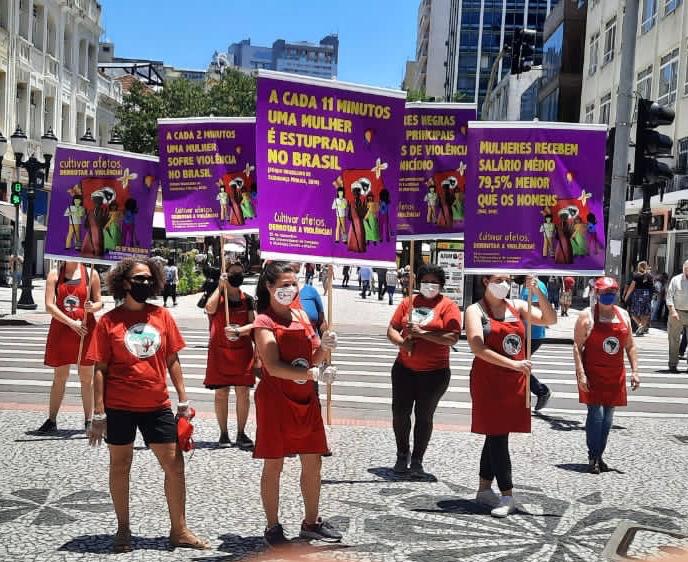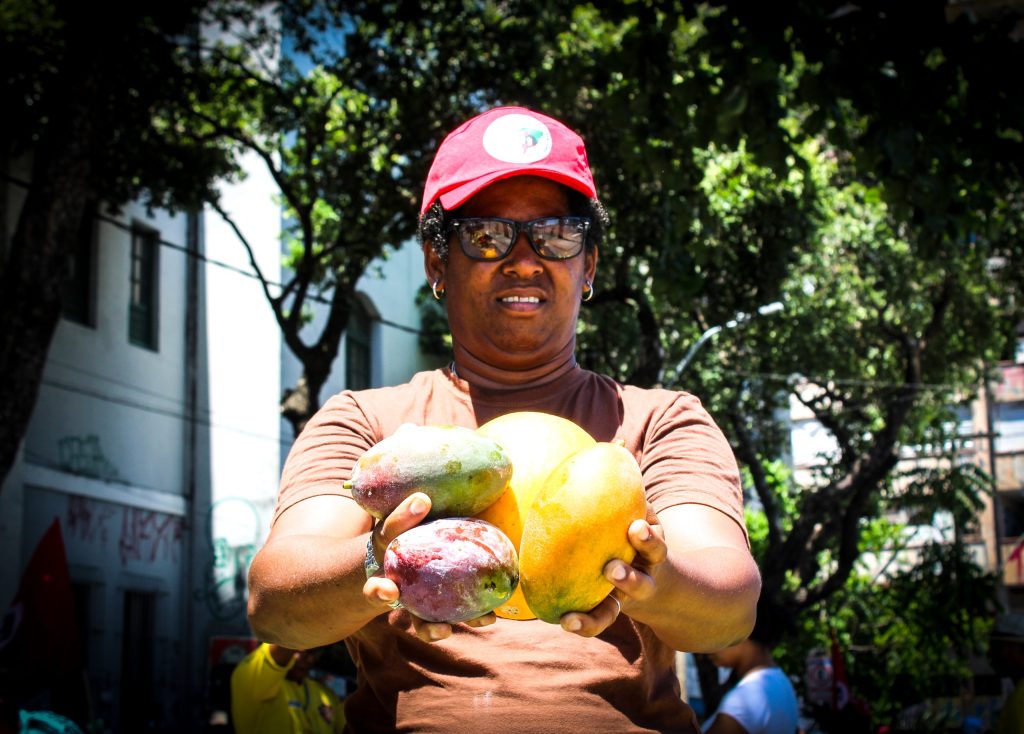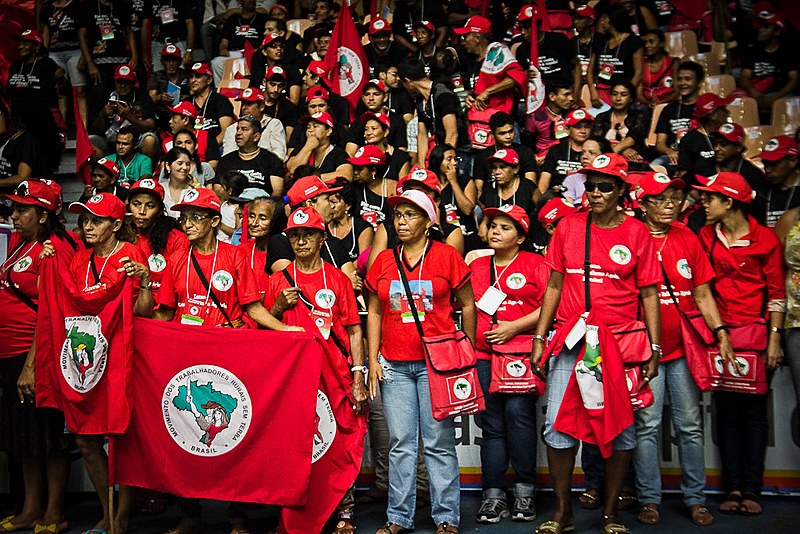As March once again approaches, we can already smell the scents of struggle, rebellion, and resistance. Landless Women are now in the territories of the Agrarian Reform, preparing for their National Season of Struggle: a series of events to take place from March 6th to 8th all over the country.
Under the motto “Agribusiness profits from hunger and violence. Women resist for land and democracy!”, the peasant women expect to promote educational activities, massive rallies for denouncing violence and for promoting their project for peasant family agriculture, as well as solidarity initiatives. Also, they will negotiate with federal and state governments on the demands of landless women for the upcoming season.
“Given women’s hopes of struggle throughout the country, we will resume the fight for land with land occupations, marches, women’s education activities, and solidarity initiatives, such as food and blood donation campaigns. Here in Alagoas, we hope to advance women’s economic interests by negotiating and denouncing violence,” says Margarida da Silva, from the National Coordination of Brazil’s Landless Workers’ Movement (Movimento Nacional dos Trabalhadores Rurais Sem Terra – MST).
Margarida also points out that the Landless Women are urging the government to appoint the regional superintendents of the National Institute for Colonization and Agrarian Reform (Instituto Nacional de Colonização e Reforma Agrária – INCRA) before their National Season of Struggle in March.
This year, their March campaign will focus on exposing the rise of hunger and violence in the country. This increase is caused mainly by the expansion of the agribusiness’ violent and cruel model, which excludes peasants, concentrates land, and destroys nature by intensifying forest fires and overusing pesticides, a practice which has grown at an alarming rate during the last presidential administration. “The theme was chosen based on our collective understanding of the way rural capital has forged close and strong ties with Brazil’s rising neo-fascism and has been one of the main promoters and sponsors of the coup attempts we have experienced since the election of president Lula,” says Lizandra Guedes, from the national coordination of MST’s gender section.
The heavier burden of hunger on women
In Brazil today, only four out of ten families manage to have full and satisfactory access to food, according to data from the 2nd National Survey on Food Insecurity in the Context of the Covid-19 Pandemic, issued in 2022 by the Brazilian Network for Research in Food and Nutritional Sovereignty and Security (Rede Brasileira de Pesquisa em Soberania e Segurança Alimentar e Nutricional – PENSSAN). In this context, hunger affects over 33 million people, who do not have their food guaranteed, while more than half the population (58.7%) faces some degree of food insecurity. The survey shows that the country has returned to 1990s levels and is back on the Hunger Map, which it had left in 2014 during the Workers’ Party (Partido dos Trabalhadores – PT) governments.
You may be wondering: what does hunger have to do with the struggles of Landless Women? Everything, since hunger in Brazil has a specific face, gender, and address. It mainly affects female-headed households, women from rural areas and the urban peripheries, and especially black women. This leads to an increase in insecurity and violence against women.
The PENSSAN Network has published data revealing significant inequalities between male-headed and female-headed households during the period covered by the survey. Hunger increased from 11.2% to 19.3% in families led by women, while it went up from 7.0% to 11.9% in homes where men were the primary breadwinners. This is due to the wage gap between men and women, among other factors.
In this context, hunger among rural women is also greater than in urban areas. In rural areas, food insecurity (at all levels) affects more than 60% of households. Out of these families, 18.6% experience forms of hunger more severe than the national average.
Agribusiness worsens violence against women
Peasant women claim that agribusiness, in its unbridled search for profit, appropriates common goods while causing hunger, poverty, unemployment, and violence, especially against women. It has become the main predator of our country’s common goods, destroying nature by illegally mining for gold in indigenous lands, burning the Pantanal and the Cerrado, and cutting down the Amazon. Therefore, agribusiness has threatened traditional populations, murdering and promoting violence against indigenous, peasant, and riverside communities, among other peoples of the forests and waters.
Lizandra explains that Landless Women decry the agribusiness because of its exclusionary and murderous paradigm, which has, she says, “sponsored several acts of violence perpetrated on the working class, especially women, LGBTIA+ individuals, and black people. Land concentration in Brazil is deeply committed to sustaining a patriarchal, racist, and violent society.”
“We condemn the increase in hunger, the concentration of land, the use of pesticides, the destruction of nature, and their direct impact on the lives and health of rural and urban women, who have been suffering from hunger and violence. We can only defeat these problems through an Agrarian Reform and a state policy to put an end to hunger and to the violence suffered by women,” adds Margarida.
Violence against women on the rise
The Landless Women have also exposed the numerous forms of patriarchal and racial violence affecting people in vulnerable conditions and claiming many victims in the countryside, such as in recent cases of femicide, LGBTIphobic murders, and suicides.
Femicide in Brazil has been escalating at a frightening rate, reaching an average of four daily victims murdered just for being women. In 2021, 1,341 women were killed by femicide. And in the first semester of 2022, 699 women were lost to this kind of crime, according to the Brazilian Public Safety Forum. Data also show that 62% of the victims were black and about 80% of them were killed by partners or former intimate partners.

Photo: MST Collection
Reports of statutory rapes against women and girls grew 12.5% in the first half of 2022 compared to the first half of 2021, totaling 29,285 victims. This means that, in Brazil, one girl or woman is raped every 9 minutes on average. In about 80% of the cases, the perpetrator was someone acquainted with the victim, and almost 75% of the victims were considered vulnerable and incapable of consent, such as in crimes committed against minors under 14. Meanwhile, domestic violence has grown to the point that one assault case is registered every two minutes in the country. In 2021, unintentional bodily harm reached 230,861 cases in the context of domestic violence in the country. Domestic violence can be psychological, moral, sexual, economic, or physical.
Moreover, Brazil remains the country where most people are killed due to LGBTphobia in the world – a disheartening statistic. In 2022, 256 LGBTQIA+ (lesbian, gay, bisexual, trans, queer, intersex, asexual, and others) people died violent deaths in Brazil. Among these cases, 242 were homicides and 14 were suicides, according to the Observatory of the Gay Group of Bahia. It is frightening to see, furthermore, such an exponential rise in violence against LGBTQIA+ people: assaults rose by 35.2%, homicides by 7.2%, and rapes by 88.4%, according to the 2022 Brazilian Public Safety Yearbook.
Popular Agrarian Reform

As for their proposals, the peasant women announce their willingness to keep resisting and fighting for democratic land redistribution, demanding the implementation of a national project for Agrarian Reform aimed at providing landless families with a place to produce healthy food to feed the Brazilian population and to fight hunger. They also claim for expanding citizen participation mechanisms, so as to enable the women and families from the MST to intensify their struggles against fascism and for the advancement of Brazilian democracy, in pursuit of emancipated and violence-free human relationships.
“A Popular Agrarian Reform has the potential to meet the needs of the entire working class. Brazilian society, thus, should be fully engaged in this struggle. By making access to land more democratic and assigning public policies to the production of healthy food through the use of agroecology, we can tackle the current state of poverty, hunger, and unemployment affecting thousands of Brazilian families,” concludes Lizandra.

